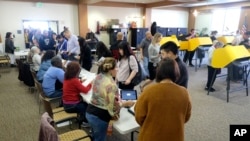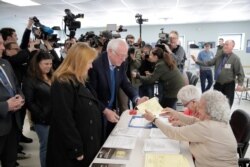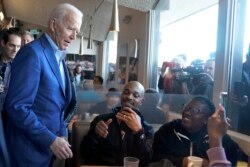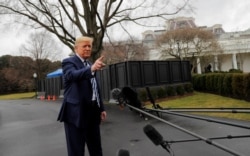Americans across 14 U.S. states are voting Tuesday in key Democratic presidential nominating contests, possibly narrowing the field of choices to face Republican President Donald Trump in November's national election.
Vermont Senator Bernie Sanders, a self-declared democratic socialist, is expected to win the largest share of delegates to the party's July national nominating convention, largely off a projected robust vote for him in California, the country's biggest state.
In all, a third of the national convention delegates will be picked in the single day of voting.
But Sanders faces stiff competition in several states from former Vice President Joe Biden, who easily captured the South Carolina primary last weekend on the strength of a large turnout of African-American voters and then was endorsed by two opponents who dropped out of the race, former South Bend, Indiana Mayor Pete Buttigieg and Minnesota Senator Amy Klobuchar.
Two other major candidates are vying for the Democratic nomination: Massachusetts Senator Elizabeth Warren, a one-time Harvard law professor, and former New York Mayor Michael Bloomberg, who has spent more than $500 million of his personal fortune funding his presidential campaign and is entered in his first party contests after skipping the first four in February.
Last month's contests in Iowa, New Hampshire, Nevada and South Carolina were all conducted on different days, but the 14 states voting Tuesday span the U.S. from coast to coast and presented the candidates with a wide mix of voters, from more liberal bastions in Vermont and Massachusetts, to conservative enclaves in Alabama, Tennessee and Texas and to the polyglot Pacific coastal state of California, with its heavy Hispanic vote.
The states of Arkansas, Colorado, Maine, Minnesota, North Carolina, Oklahoma, Utah and Virginia also are voting, along with the U.S. territory of American Samoa and Democrats living abroad.
In CNN exit polls, voters in both Virginia and North Carolina widely said it was more important for them to pick a candidate who can beat Trump rather than to find a presidential choice who agreed with them on issues. In Alabama, Maine and North Carolina, voters said their overwhelming feeling about the presidential race is that they are angry at Trump, not just dissatisfied with his performance.
Pre-election polls showed Biden winning the most Super Tuesday states, but with Sanders winning the all-important delegate count for the day, largely because of California, which by itself accounts for a fifth of the delegates to the national convention.
A total of 1,991 delegates to the national convention is needed to secure the party's presidential nomination and no candidate is anywhere close to that number after the voting in the four early states; Sanders leads in the early count after the four states that voted in February, with 60 delegates over Biden's 54.
Delegates to the national convention are awarded state by state on a proportional basis according to the vote count in each state's primary election, but candidates have to clear a 15% vote threshold in order to win any delegates in states as a whole or in individual congressional districts.
The key question in California is whether any of Sanders's challengers clears the 15% threshold to keep him from winning a massive haul of national convention delegates. Pre-election polls also show Sanders doing well in the second biggest prize of the day, in the southwestern state of Texas, with Biden ahead in smaller states with a fewer number of delegates at stake.
Bloomberg has advertised heavily in the Super Tuesday states, but his halting performance in two nationally televised debates raised questions about whether he would be able to amass wide voter support.
Warren once was near the top of Democratic favorites for the party's presidential nomination to try to keep Trump from winning a second term in the White House.
She has yet to win a state nominating contest, though, and could even lose her home state of Massachusetts to Sanders on Tuesday. She is hoping to win the nomination at a brokered national convention with no candidate clinching the nomination ahead of time, which has not occurred since 1952.
Trump has commented almost daily about the Democratic race, dishing out negative nicknames to all of his would-be Democratic opponents, calling Sanders "Crazy Bernie," Biden "Sleepy Joe" and Bloomberg "Mini Mike" for his short stature.
The president said Tuesday he would gladly debate any of the Democrats come the weeks before the Nov. 3 election when the party's nominee has been selected.
“Whoever it is, I don’t care, we’ll take them on,” Trump told reporters outside the White House. “I’ll debate any of them, gladly. Very gladly.”
He said there is "no question the Democratic establishment is trying to take it away from Sanders, no question in my mind.”








